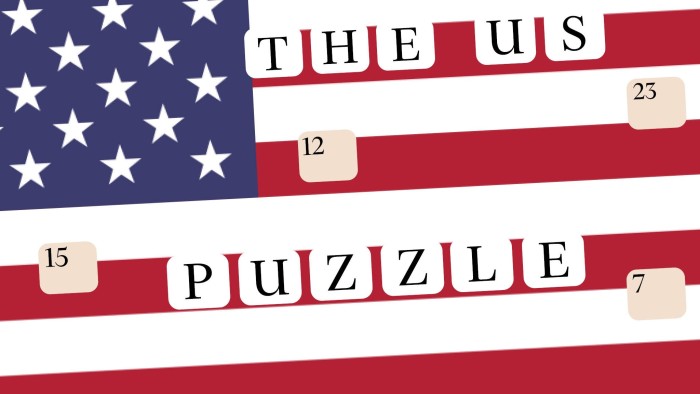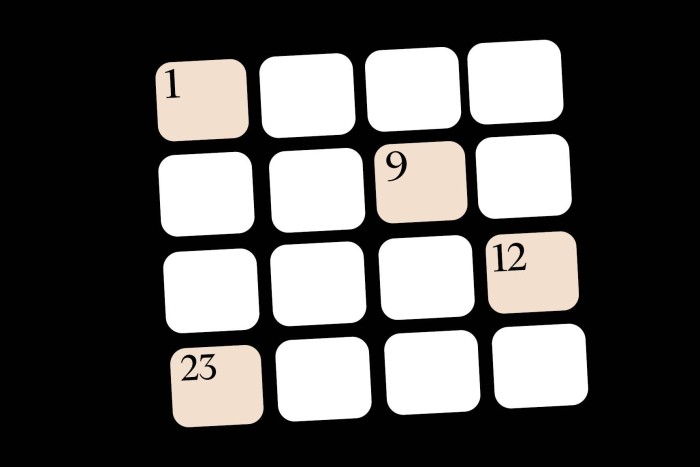The American way of making crosswords

Roula Khalaf, Editor of the FT, selects her favourite stories in this weekly newsletter.
Tell us a bit about yourself
I am Oliver Roeder, the FT’s US senior data journalist, based in New York. I also write for the magazine about stuff — horseracing, chess tournaments, the world’s tallest flagpole. A bit frenetic, I realise. And — miraculously — I am now Reorder, the setter (constructor, as we Americans say) of our new American-style crossword puzzle.
What’s different between an American-style puzzle and UK cryptic crosswords?
Well, UK puzzles have up to 40 clues, their solutions spread over a 15 by 15 grid, with lots of blocked squares. The US puzzle tends to adopt the same-sized grid but has around 80 clues, their solutions tightly packed, with very few blocked squares. When it comes to clueing, UK setters set devious, cryptic, challenging clues. Clues in US puzzles are more straightforward.
What’s your background in puzzles?
Games are my family’s love language. They are how we come together. Chess, backgammon, Scrabble, euchre, pinochle, Ticket to Ride — no visit to my parents’ house can be escaped without at least one. I have arranged my professional life around games, too, whether on purpose or not. I did a PhD in game theory, covered games as a journalist and wrote a book about the role games have played in the development of artificial intelligence. Plus, the ever-present stack of crosswords on our kitchen table growing up. My mother and grandmother taught me the music and language of crosswords.
I’m exhausted. I take it you occasionally sleep and eat
I eat while solving puzzles, naturally. I sleep . . . occasionally.
Some FT cryptic compilers can’t walk down a street without trying to make a clue out of a passing road sign or shopfront. Are you a bit like that?
In a sense, yes. In US puzzles, the answers, rather than the clues, are the real stars, so I try to stay attuned to modern usage and coinage. Crosswords, like the English language, ought to evolve, and stay fresh. I take mental notes of colourful words and phrases that I would like to stick in a puzzle one day — and of course I add them to my software’s word list, the true currency of the modern setter.
Which is how long?
My list has about 450,000 words and phrases. It’s about 6.3 megabytes of text. Each word is scored from 0 to 100 on how nice it would be to include in a puzzle.
OK, so what’s the first entry under the letter Z?
Zabaglione — the Italian dessert.
So how would you clue that?
“Dessert often served in a champagne coupe”— if I wanted to make it difficult. “Italian dessert made with egg yolks, sugar and sweet wine” is maybe a little easier. I’m not sure it is a great fill, to be honest. Hold on, adjusting its score in my word list.
When you say, ‘I’m not sure it’s a great fill’, you mean zabaglione won’t work well with the cross-letters?
Interactive crosswords on the FT app

Subscribers can now solve the FT’s Daily Cryptic, Polymath and FT Weekend crosswords on the iOS and Android apps
Possibly that, but I also worry it is a tad obscure — for example it also has another spelling, zabaione. Crosswords should be made difficult and interesting by the misdirection and “aha” moments provided by the clues, not by the obscurity of the answers.
My colleague, Cordu, says she did your first FT puzzle in about an hour and a half. Your colleagues in the US told her it was impossible. Her technique was to glance through as many clues as possible as quickly as possible to start filling the grid. Is that a solving technique you’d recommend?
That seems a great technique. In fact, how else would you begin? I suppose there are as many methods of solving as there are solvers, and none is wrong. These things are meant to be fun. Plus, in US puzzles every letter appears in an across and a down answer, so you have at least got a chance of checking your work.
How does a 90-minute solve compare to your own usual solving times?
My average for a typical, hard American puzzle is about seven minutes.
You’re kidding?
No, but imagine how much time I wasted to get there. (I should mention that there are people much, much faster than me. I met many of them at the American Crossword Puzzle Tournament last month.)
If you and others are solving 80-clue crosswords so quickly, shouldn’t the clues be harder?
Crosswords are appealing because of their solverships — like, we are all doing the exact same puzzle in the newspaper everyday. We are participating in a collective experience. That is important, and therefore the puzzles should be widely accessible. Tough, but accessible. It doesn’t much matter if I do it in 10 minutes and you do it in an hour. We have each achieved something, and we have done it, in a sense, together.
I disagree with you about the answers being more important than the clues. Some of your clues are pithy, adroit and annoyingly clever, which suggests you are trying to meet the cryptic-ky nature of UK crosswords halfway. Agreed?
I am going to take “pithy and annoying” as a compliment. The clues are important, of course — they are the only thing the solver has at the beginning, after all. But I think this is the crucial, transatlantic puzzling difference. In a British crossword, you marvel at the incredible clue. In an American crossword, you marvel at the incredible answer. “Wow, I can’t believe they got that word into the grid.”
https://app-ft-com.ezp-prod1.hul.harvard.edu/crossword/crossword_index
Comments